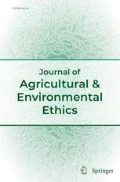Abstract
Producers, traders, and consumers oforganic food regularly use the concept of thenatural (naturalness) to characterize organicagriculture and or organic food, in contrast tothe unnaturalness of conventional agriculture.Critics sometimes argue that such use lacks anyrational (scientific) basis and only refers tosentiment. In our project, we made an attemptto clarify the content and the use of theconcepts of nature and naturalness in organicagriculture, to relate this conception todiscussions within bioethical literature, andto draw the implications for agriculturalpractice and policy.
Qualitative interviews were executed with arange of people in the field of organicagriculture and with consumers of organicproducts, on the basis of a list of statementsabout the meaning of the concept of naturalnessformulated by the authors. Based on the resultsof the interviews, we distinguished 3 aspectsof the concept of naturalness: natural as theorganic (life processes), natural as theecological, and natural as referring to thecharacteristic nature of an entity. We relatedthese conceptual aspects to three mainapproaches within the field of organicagriculture: the no chemicals approach, theagro-ecological approach, and the integrityapproach. It became clear that these approachescan also be recognized in the change ofattitude of farmers as they convert fromconventional to organic agriculture, and in theattitudes of consumers of organic foodproducts.
We conclude that the idea of ``naturalness'' canbe used to characterize organic agriculture andto distinguish it from conventionalagriculture, but only if naturalness not onlyrefers to not using chemicals but also toecological principles and respect for theintegrity of life. Thus perceived, theprinciple of naturalness can also serve as aguide to future developments in the field oforganic agriculture. As part of the holocentricethics of organic farming the value ofnaturalness has three dimensions: a cognitiveone, an emotive one, and a normative one.
Similar content being viewed by others
REFERENCES
Amersfoort, I. I. Van and H. M. M. de Wit, Biologische landbouw en natuurlijkheid, een kwalitatief onderzoek (Projectnummer D270, Motivaction, Amsterdam, 2000).
Baars, T. and L. Brands, Een koppel koeien is nog geen kudde (Louis Bolk Instituut, Driebergen, 2000).
Baars, T., Don't Forget the Guide. PhD-thesis, Wageningen University, 2001 (in prep).
Bloksma, J., Aantekeningen over luizen (Louis Bolk Instituut, Driebergen, 1991).
Dutilh, C and L. Mustard,”Nederlanders over duurzaam geproduceerde voeding,” Voeding Nu 4 (2001), 29–31.
Gleich, A. von, Der wissenschaftliche Umgang mit der Natur. Ñber die Vielfalt harter und sanfter Wissenschaften (Frankfurt, Campus Verlag, 1989).
Groh, T. M. and S. S. H. MacFadden, Farms of Tomorrow: Community Supported Farms, Farm Supported Communities (Kimberton, Bio-dynamic Farming and Gardening Association, 1990).
IFOAM, Basic Standards for Organic Production and Processing (Basel, IFOAM General Assembly, 2002).
Keulartz, J., S. Swart, and H. van der Windt, Natuurbeelden en natuurbeleid (Den Haag, NWO Ethiek & Beleid, 2000).
Lammerts van Bueren, E.,M. Hulscher, M. Haring, J. Jongerden, J. D. van Mansvelt, A. P. M. den Nijs, and G. T. P. Ruivenkamp, Sustainable organic plant breeding - a vision, choices, consequences and steps (Driebergen, Louis Bolk Instituut, 1999).
LNV, Een biologische markt te winnen: beleidsnota biologische landbouw 2001-2004 (Den Haag, Ministerie van Landbouw, Natuurbeheer en Visserij, 2000).
Nuffield Council on Bioethics, Genetically Modified Crops: The Ethical and Social Issues (London, 1999).
Østergaard E., “The Role of Learning in Farmers Conversion to Ecological Agriculture,” in B. Öhlmer and D. Lunneryd (eds.). Learning in farmers decisionmaking (Uppsala, Swedish University of Agricultural Sciences, Report 116, 1997).
Pollan, M., “The Organic-Industrial Complex,” The New York Times Magazine May 13/Section 6 (2001), p. 31.
Raad voor Landelijk Gebied, Kansen voor de biologische landbouw in Nederland in de periode tot 2015 (Amersfoort, Publication RLG 01/3, Raad voor Landelijk Gebied, 2001).
Reiss, M. and R. Straughan, Improving Nature. The Science and Ethics of Genetic Engineering (Cambridge, Cambridge University Press, 1996).
Ruitenbeek, B. van, “Niet alleen boeren moeten omschakelen,” Nieuwsbrief van Platform Biologica 35 (February 2001), 1–2.
Sagoff, M., “Genetic Engineering and the Concept of the Natural,” Philosophy and Public Policy Quarterly 21(2) (2001), 2–10.
Sieferle, R. P., Die Krise der menschlichen Natur (Frankfurt am Main, Suhrkamp, 1989).
Simon, S. B., C. W. Howe, and H. Kirschenbaum, Values Clarification, a Handbook of Practical Strategies for Teachers and Students (New York, Hart Publishing Company, 1978).
Task Group on Public Perceptions of Biotechnology, Ethical Aspects of Agricultural Biotechnology (Den Haag, 1999).
Vijverberg, A. J., “Natuurlijk of chemisch?” Gewasbescherming 32(4,5) (2001), 108–109.
Visser, M. B. H. and H. Verhoog, De aard van het beestje. De morele relevantie van natuurlijkheid (Den Haag, NWO Ethiek & Beleid, 1999).
Waiblinger S., T. Baars, and C. Menke, “Understanding the Cow - the Central Role of Human-Animal Relationship in Keeping Horned Dairy Cows in Loose Housing,” Proceedings of the 3rd Workshop of the NAHWOA (Clermont-Ferrand, France, October 2000).
Wit, M. de and I. van Amersfoort, “Vooral postmaterialisten en kosmopolieten kopen biologisch,” Voeding Nu 4 (2001), 18–20.
Author information
Authors and Affiliations
Rights and permissions
About this article
Cite this article
Verhoog, H., Matze, M., van Bueren, E.L. et al. The Role of the Concept of the Natural (Naturalness) in Organic Farming. Journal of Agricultural and Environmental Ethics 16, 29–49 (2003). https://doi.org/10.1023/A:1021714632012
Issue Date:
DOI: https://doi.org/10.1023/A:1021714632012



